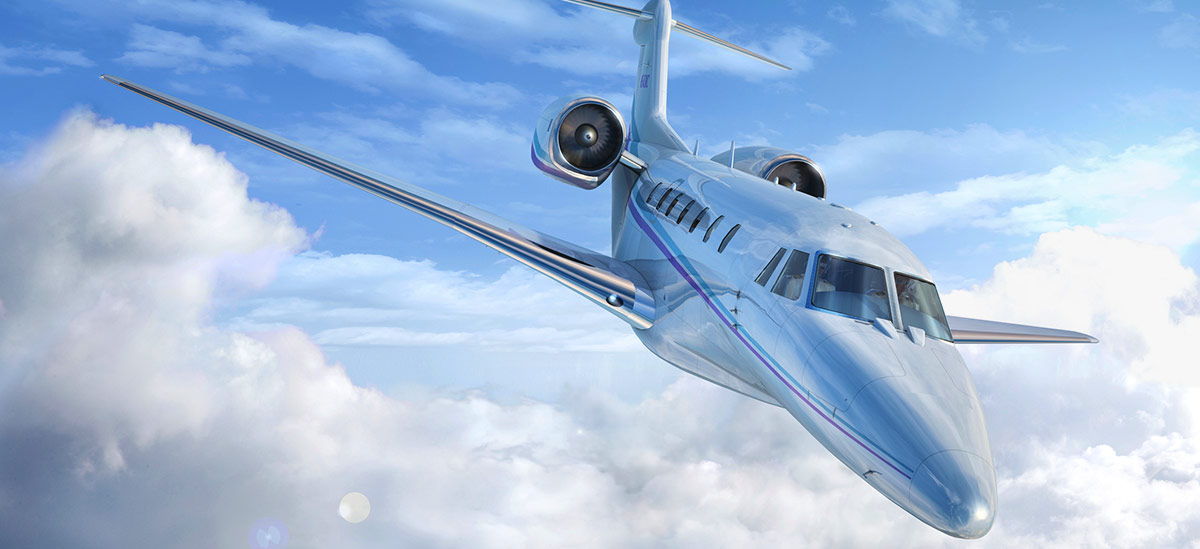
While business aviation has been an active industry for decades, the COVID-19 pandemic greatly raised its appeal of owning a private aircraft, as the challenges facing commercial travel hampered companies’ ability to conduct business in remote locations.
As a result, many companies have turned to business aviation to meet complex travel needs; enhance the efficiency, productivity, safety, and security of key personnel; and remain nimble and competitive in an unconventional environment. The impact is clear, as S&P companies that utilize business aviation outperform those that don’t by 70%.1
Contending with Low Inventory
Given the vigorous business aviation market over the past few years, inventory of private aircraft is now limited, especially for certain in-demand cabin sizes. Inventory for younger aircraft (meaning pre-owned jets that were manufactured less than five years ago) remains consistently low. When these jets do become available, they move off the market very quickly. Since younger aircraft are harder to obtain, the majority of available inventory is largely six years old or older. While still airworthy, many of these older models often require increased maintenance and other operational costs.
New aircraft are in high demand, with delivery backlogs on orders extended into 2026 for some manufacturers. This backlog stems from interest in brand new equipment, coupled with supply chain issues and the limited availability of skilled workers in the assembly process. In addition, certification of the much-anticipated G700 is delayed due to lack of FAA clearance. Given these circumstances, current business jet owners are likely to retain their existing unit until a new model becomes available, contributing to the overall low inventory cycle of aircraft available for purchase.
The Calculus Behind Investing in Private Aircraft
Even in a period of low inventory, pursuing private aircraft ownership may still be worthwhile for many businesses, depending on their particular needs. One part of the equation comes down to the anticipated required investment in travel frequency, according to Ramy Sidhom, head of PNC Aviation Finance. “For many companies and individuals, the target hours of usage annually is 125-150 hours to seriously consider ownership to replace charter, fractional, or commercial options. The benefits of accessibility, convenience, and costs of ownership become more attractive in this usage ‘sweet spot’.”
In terms of which aircraft to evaluate, Sidhom noted that travel destinations are a critical factor. Commercial aircraft service around 500 airports nationwide, while private aircraft can access more than 5,000 airports, dramatically increasing accessibility and business efficiency. “It’s not just about how frequently you are flying, but also what your destinations are – coast to coast, regional, etc. That consideration will drive what type of aircraft may be most suitable to your company’s needs.”
It's important to factor in the full range of costs associated with private jet ownership, beyond the initial outlay. “Owning a jet involves various costs. In addition to the purchase of the plane, there are upfront purchase fees like a broker, attorney, and any pre-inspections. Upon the closing of the purchase, buyers can expect several fixed and variable costs. Fixed costs include insurance, engine maintenance programs, hangar fees, crew salaries, and depreciation. Variable costs encompass fuel, maintenance, and landing fees, which fluctuate based on usage and market pricing. Many of these costs can be consolidated by hiring a management company.”
Sidhom added that there are also some common misconceptions around jet ownership, specifically around chartering. For instance, an owner shouldn’t expect that chartering their plane will render an offset of aircraft costs or even generate revenue. Strong performance in the charter market has long been seen as a launching pad to ownership, but there are some unforeseen costs associated, including higher maintenance costs. As the charter space continues to have robust demand, new or incremental ownership of business aircraft is expected to grow as well.
While pursuing private jet ownership may seem a daunting and complex process, experienced professionals, such as those at PNC Aviation Finance, can offer important guidance. “Purchasing a jet brings many benefits of convenience, safety, and productivity. Careful research and due diligence, while partnering with industry professionals, helps to ensure well-informed decisions.
Ready to Help
Discover how PNC Aviation Finance helps to make private aircraft ownership a reality. Reach out to your relationship manager, or contact us.
Source
1. Enhanced Productivity - No Plane No Gain




